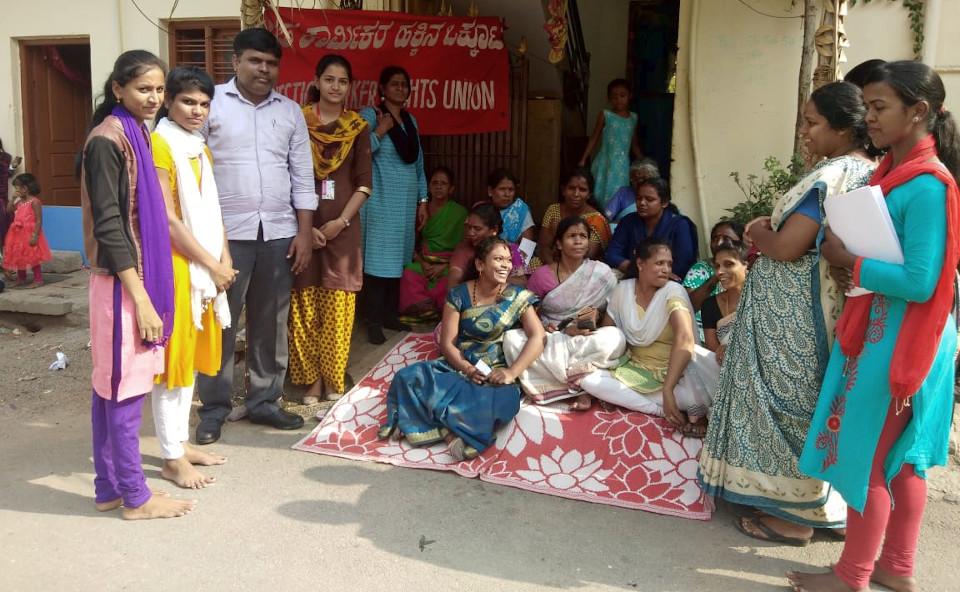
Meeting of domestic workers unionists in Indica.
As part of the Feminist Internet Research Network, we are including a series of short pieces on reflections by researchers on the ground, especially in relation to methods of research, interactions with community and participants, ethics and values of their research projects and experiential learnings. This series of four articles on research in relation to platform economy and domestic workers was put together by the researchers Aayush Rathi and Ambika Tandon. You can see other reflections on ethics, access, methodology from a feminist perspective here.
Note from Ambika and Aayush: Zeenathunnisa had originally written her experience and learnings from each interview she had done. I have summarised some of her notes in this account. While I have attempted to capture the rich insights she had to share, some may have been lost in the process of summarising.
While I have previously done data collection for research purposes, this was the first time I was researching domestic workers looking for work through online agencies. I interviewed 7 workers from different online agencies namely: CleanPro, Helper4U, Housejoy, Urban Clap (now Urban Company) and Unplango.
I interviewed 7 workers from different online agencies namely: CleanPro, Helper4U, Housejoy, Urban Clap (now Urban Company) and Unplango.
In each of the interviews I did, conveying the necessity of doing the research and the usefulness of each interviewee’s experience was necessary. Interviewees would often be suspicious of my motivations behind specifically seeking them out for the interview. My response to these questions was that the usage of the interview was not for any personal gain, but as a humanitarian act both for me and the interviewee. For example, to one interviewee I said, “You have come from Uttar Pradesh for work in Bengaluru and you are staying without your family for work. Just like that, several other people come from other villages, or other states and face problems that you do. So that others will not have to face the same problems, we are doing this research.”
It also helped to inform them that I was a social worker, especially when they asked me about how I could even understand the problems that they faced. In these situations, I would tell them about some of the problems that domestic workers face such as poor working conditions, lack of timely salary payments, no employee protections etc. Upon listing these, interviewees would start trusting me and speak about the challenges they face in working through the company.
Despite this, not all interviews went by smoothly. Most interviewees were not very cooperative. This may have been because they are unfamiliar with what research is, and why we were doing the survey. At times, the questions were not straightforward for them to understand either. Some interviewees would also get emotional during the interview. This could be relating to the issues that we were speaking to them about, or even challenges with the interview process such as the difficulties with giving answers to some of the questions, especially as many were personal in nature.
I also felt that the hesitance of workers was because they were very scared of repercussions from the company and were apprehensive of sharing incriminating information about the company. They were scared of companies the same way that a person who has committed a criminal act is scared of the police. They were scared that they could lose the job if anything that they said about the issues with the company were leaked. I had to repeatedly assure them that the information they share will be kept confidential and not shared with anybody else.
I also felt that the hesitance of workers was because they were very scared of repercussions from the company and were apprehensive of sharing incriminating information about the company.
Similarly, it was not useful to identify as a social worker with companies. Companies were hesitant in sharing information of workers who we could speak to. Despite promising to send the information, company representatives wouldn’t come through. These situations meant that the approach I used to speak to domestic workers, was like the work that detectives do. While waiting for hours for a hesitant company representative to share information of workers we could speak to, I went to the company's compound where some workers were. While they were naturally hesitant to speak to us at the time, they shared their contact information so we may speak to them later.
With one interviewee, Sapna, my interaction continued after the interview as well. A couple of weeks after the interview, she had called me asking for help with getting an Aadhaar card made.1 She also had joined a new place for work and was not able to get the salary due to her from an old employer. She had called seeking help with these issues. I also asked her to attend a union meeting. While she was keen, she was unable to get leave from her new employer.
I also asked her to attend a union meeting. While she was keen, she was unable to get leave from her new employer.
The experience of doing this research was very different from the work that we usually do for the Domestic Workers’ Rights Union (DWRU). When we go to areas of Bengaluru to interact with domestic workers about their rights and to secure their membership with the DWRU, we speak to them about the difficulties they face. But research work is different from our routine work. Here we were expected to collect information regarding the third parties and agencies involved, while our routine work is about awareness building. At the same time, this work was possible only because of my experience of regularly interacting with domestic workers as a part of my work at DWRU. I was able to craft responses and mould my approaches through this prior experience.
- 7064 views






Add new comment